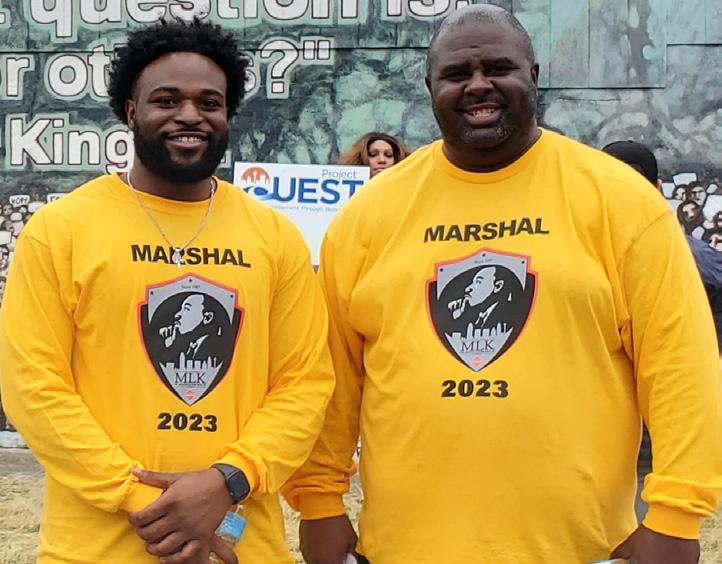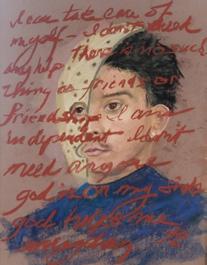
3 minute read
Students share lessons from MLK March
Special to the Logos
More than 200 members of the University of the Incarnate Word community walked together among the thousands participating in the Martin Luther King Day March on Monday, Jan. 16.
Advertisement

Before the march, Dr. Arturo Chavez, assistant vice president of University Mission and Ministry, asked students to share their reflections on these things -- Beloved Community and Nonviolence -- and write about them after the march on San Antonio’s east side.
“I really appreciated the march,” said Alix Roge, an exchange student from France. “Everyone was friendly and looked after each other. The atmosphere embodied Martin Luther King’s dreams and hopes. This march was so powerful. I was touched by its meaning. I will encourage people to read MLK’s speeches. As an international student, this march had an important impact on me. I learned a part of the American culture and tradition. I was able to discover life outside the campus.”
Marian Dimaala, who took a Social Justice Leadership class under Chavez, brought her mother with her to the march.
“It was our first time going,” Dimaala said. “We definitely will be bringing our whole family with us next year. My participation in the MLK March will help me co-create the Beloved Community by spreading awareness of his teachings and walking side-by-side by UIW community to support his cause. My next step will be finding other events and opportunities like this.”
My participation in the MLK March will help me co-create the Beloved Community by spreading awareness of his teachings and walking side by side my UIW community to support his cause. My next step will be finding other events and opportunities like this. This allowed me to study, practice and spread nonviolence by reflecting on his teachings which focused on seeking justice and equality through nonviolent acts. I felt like I was a part of something bigger than myself and I felt unified with those around me. This impacted others by showing support for the black community and the inequality and racism they have experienced and continue to experience on a daily basis. It allowed me to show my support in standing against racism and injustice.”
Christian Brown, a sophomore kinesiology major, said his participation as a UIW student helped show “my support and spirt for equity, love, respect, and power. Participating in the MLK March helped me study, practice, and spread nonviolence by helping me realize that we are able to accomplish good effects just by marching, showing and spreading peace by standing together
(for) a cause.”
Air Force Sgt. Emmerson Galupo, a senior general health science major, said, “Dr, King’s bravery to fight for justice and equality has been my true moral compass not only as an airman but as an American. One of my favorite Martin Luther King quotes is from his book ‘Strength to Love’ (1963): ‘The ultimate measure of a man is not where he stands in moments of comfort and convenience, but where he stands at times of challenge and controversy.’ I think this truly points out that many people talk but are they willing to ‘walk’? Meaning, take actions?”
Reception set for art exhibit on homeless
The Department of Art is holding a reception 6-8 p.m. Friday, Feb. 17, to mark the opening of the “Homeless in San Antonio” exhibit at the University of the Incarnate Word.
The artist, Guy Blair, is expected to attend the reception in the Semmes Art Gallery at Kelso Arts Center.
The exhibit will be available for viewing 10 a.m.-5 p.m. weekdays through March 17.
Blair, whose work is represented by Art Gallery Prudencia of San Antonio, spent 40 years as a Catholic priest ministering to the deaf and homeless communities. This exhibit is considered a blending of this service and his interest in art where he works primarily in the medium of pastels and watercolors.

Born 1951 in Connecticut, Blair is largely self-taught. He said he always wanted “to do” art, but was devoted to his ministry as a priest. In the past eight years he has seriously paid attention to his desire to paint. Each homeless person who is portrayed was interviewed, given $10 for their time, and gave permission for their portrait to be painted.
“As we walk by homeless people on the streets of San Antonio, most people tend to look through them or judge them as perhaps deserving of the situation they are in,” Blair wrote. “This attitude allows people to build an emotional barrier, giving them permission not to connect with the homeless as destitute people whose suffering and tears are as real as our own.”



